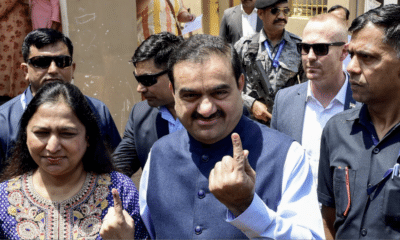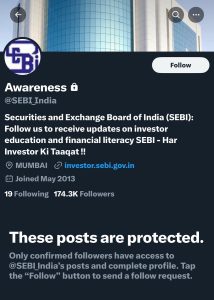Global News
Adani Controversy Deepens: Hindenburg Alleges SEBI Chairperson Linked to Offshore Entities in Money Siphoning Scheme
In a fresh wave of allegations that could potentially shake the financial oversight ecosystem in India, Hindenburg Research has raised serious concerns about SEBI Chairperson Madhabi Buch’s alleged involvement in offshore entities linked to the Adani Group’s money-siphoning scandal. This development has come at a time when the Adani-Hindenburg controversy is already making headlines globally, with new revelations surfacing almost daily.
The Allegations
According to Hindenburg, the SEBI Chairperson had stakes in obscure offshore entities that were purportedly used by Vinod Adani, brother of Gautam Adani, to siphon money. The research firm cited whistleblower documents to substantiate its claims, alleging that Buch’s reluctance to take action against certain suspect Adani shareholders might be tied to her own interests in these very offshore funds.
NEW FROM US:
Whistleblower Documents Reveal SEBI’s Chairperson Had Stake In Obscure Offshore Entities Used In Adani Money Siphoning Scandalhttps://t.co/3ULOLxxhkU
— Hindenburg Research (@HindenburgRes) August 10, 2024
Hindenburg pointed to a series of emails and documents that reportedly show Buch’s involvement in the Global Dynamic Opportunities Fund (GDOF), a Mauritius-based entity allegedly used in the Adani money siphoning operation. The allegations extend to her husband, Dhaval Buch, who, according to Hindenburg, moved assets out of her name ahead of her appointment as a SEBI Wholetime Member in 2017.
SEBI’s Response: Silence and Social Media Lockdown
What stands out in this unfolding drama is the timing of these allegations. Hindenburg’s report comes at a crucial juncture when SEBI is under scrutiny for its handling of the Adani case. The Supreme Court of India has already questioned SEBI’s inability to uncover the real holders of offshore funds associated with the Adani Group, casting doubt on the effectiveness of the regulator.
In a move that has raised even more eyebrows, SEBI India locked its Twitter account within minutes of the Hindenburg expose. This sudden action has only fueled speculation, with critics questioning whether SEBI is attempting to control the narrative or avoid public scrutiny during a time of intense pressure.
Given that Madhabi Buch has held significant positions at SEBI since 2017, the allegations could be perceived as a direct attack on her credibility and the integrity of the regulatory body she leads. This raises the question: Are these allegations a genuine concern, or are they strategically timed to create a smokescreen that diverts attention from other pressing issues?
The Larger Implications
If the allegations are proven true, the implications could be far-reaching. For one, it would not only tarnish SEBI’s reputation but also shake investor confidence in India’s regulatory mechanisms. Buch’s potential conflict of interest could suggest a deeper malaise within the regulatory framework, where those tasked with oversight might be complicit in the very activities they are meant to police.
On the other hand, if the allegations are baseless, they could be part of a larger strategy to undermine SEBI’s credibility at a time when it is expected to act decisively in one of India’s most significant corporate controversies.
The Need for Transparency
Regardless of the veracity of Hindenburg’s claims, the situation underscores the need for greater transparency and accountability within regulatory bodies. SEBI’s silence on the matter, combined with its perceived inaction against the Adani Group’s suspect shareholders, only fuels speculation and erodes public trust.
For SEBI, this is a pivotal moment. How it responds to these allegations will not only determine the future of its Chairperson but could also set a precedent for how regulatory bodies are expected to handle conflicts of interest in the future.
The allegations against Madhabi Buch add another layer of complexity to the ongoing Adani-Hindenburg saga. As the story unfolds, it remains to be seen whether these claims will lead to meaningful action or if they will fade into the background as another chapter in the tumultuous history of corporate India. One thing is certain, though: the call for transparency and accountability within India’s regulatory bodies has never been louder.













































Pingback: Rahul Gandhi Questions SEBI Integrity After Hindenburg Report